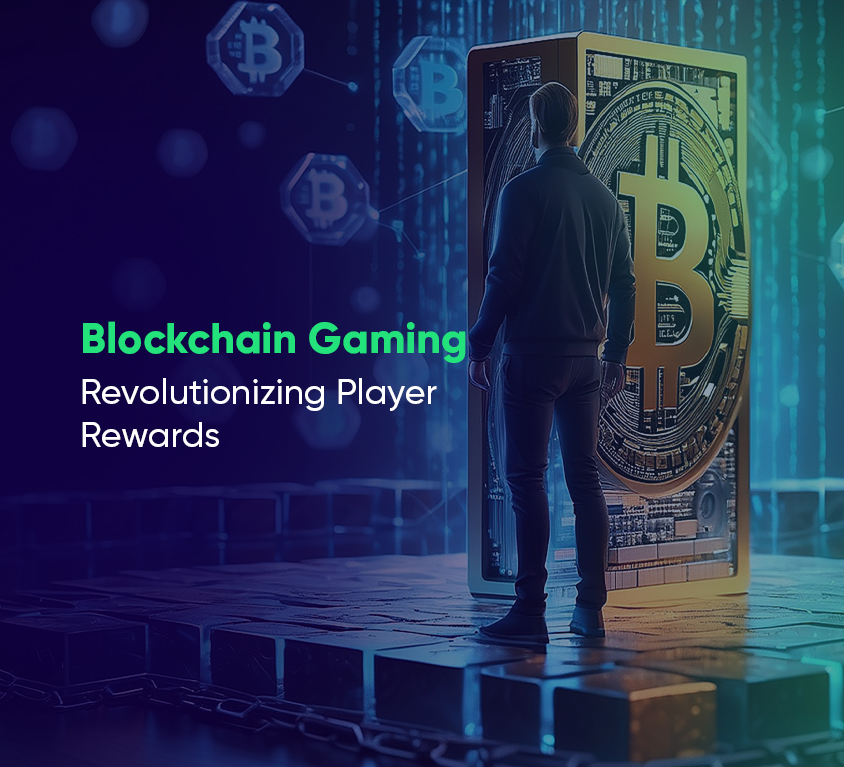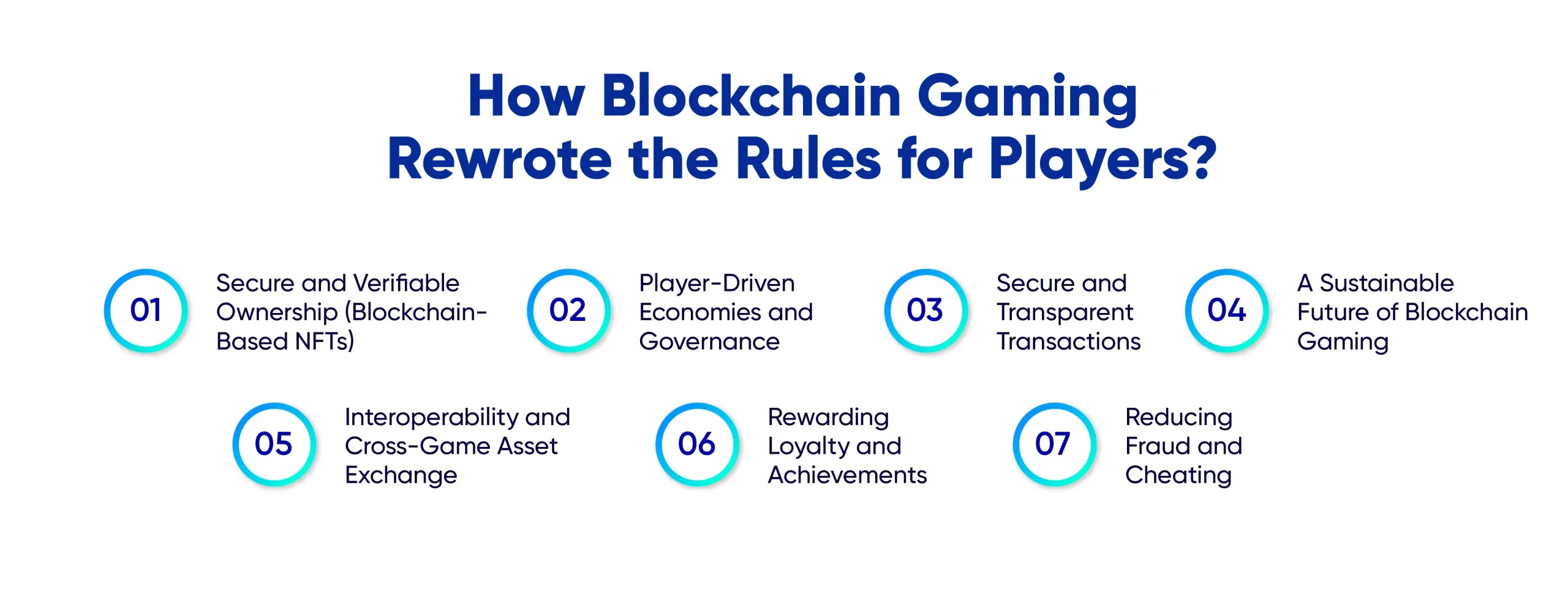
Introduction
Blockchain & Web3 Services Trusted By Leaders
- Develop innovative solutions using our state-of-the-art blockchain expertise.
- Achieve accelerated growth with robust & scalable Web3 consulting.
- Unlock 360-degree security with our top-rated blockchain development.
Top Blockchain Games: Revolutionizing Player Rewards
Traditional games apart were centralized with their reward systems. Player get rewards and points that disappear more quickly than their patience. Since the introduction of blockchain, the gaming industry has experienced significant change. This paradigm shift has changed the way of the reward system. Blockchain gaming offers valuable in-game items and tangible rewards to loyal players – that’s a loyalty program. The player’s incredible armor, pets, and weaponry are real, and obtainable as NFTs. They can even vote on how a game develops in certain cases this process is referred to as DAOs. You now play as a member of the team, contributing to the development of your beloved virtual environment. In this blog, we will learn what are blockchain games, best blockchain games and, how blockchain is transforming loyalty and player rewards.What are Blockchain Games?
For traditional games, game development companies set the rules like players’ accounts are linked to their servers, and in-game items are controlled and not transferable. This limitation allows for inflated and depreciated virtual assets. However, blockchain games have open, fair rules written in smart contracts, with developers unable to change them. Moreover, game accounts and virtual assets are owned and transferred to players, and configurable virtual game resources can be configured using smart contracts. Blockchain technology ensures no fake game content and allows for the transfer and replacement of virtual assets by tokens, bringing the value of virtual game assets closer to real assets. In short, blockchain gaming empowers players with ownership, control, and a more secure and exciting gaming experience.Traditional Games vs Blockchain Games
Blockchain in gaming allows players to own their digital assets. Players experience true freedom and ownership. Unlike traditional games, where items are fleeting pixels, blockchain grants players true ownership of their in-game assets, which are stored in their digital wallet as unique NFTs. As a result, blockchain integration in the game eliminates the risk of disappearing rewards and allows players to learn from past triumphs and stumbles. Firstly, Blockchain games run on a decentralized network. They provide players with complete transparency into their gameplay and the actions of others. As a result, they get secure and trustless item trading, ensuring the authenticity of every digital asset acquired. Secondly, Blockchain games record every move and achievement which empowers players to provide valuable feedback for a continuously evolving gaming experience. Lastly, web3 gaming is not just a fancy technology but it’s about putting the power back in the hands of players. Players can own their digital destiny, experience true freedom, and leave a lasting legacy in their favorite games.
Feature |
Traditional Games |
Blockchain Games |
Ownership of In-Game Assets |
Players don’t own in-game items, weapons, or characters. | Players own in-game assets as NFTs (Non-Fungible Tokens) stored in their digital wallets. |
Ecosystem |
Centralized servers are controlled by game developers. | Decentralized network offering transparency and security. |
Data Storage |
Player data and game progress are stored on centralized servers, vulnerable to loss or deletion. | Player data and game progress are permanently stored on the blockchain. |
Transparency |
Limited transparency into game development and mechanics. | A transparent system allows players to see what’s happening behind the scenes. |
Trading and Marketplace |
Limited or no ability to trade in-game items. | Secure and trustless trading of in-game assets through marketplaces. |
How Blockchain Gaming Rewrote the Rules for Players?
Playing games has undergone a seismic shift because of blockchain implementation in traditional games. Moreover, the rise of decentralized in-game economies has changed player interaction with virtual worlds. Let’s see how blockchain rewrote the rules for players:
1. Secure and Verifiable Ownership (Blockchain-Based NFTs)
With blockchain-based games players can own in-game items but as unique digital assets. NFTs represent a distinct virtual item, like a powerful weapon, a rare cosmetic, or a coveted character skin. Blockchain technology ensures the scarcity, authenticity, and provenance of these NFTs, adding a new layer of value to the gaming experience. As a result, you get a thriving marketplace where players can trade, buy, and sell their in-game possessions securely.2. Player-Driven Economies and Governance
Decentralized Autonomous Organizations (DAOs) and community voting mechanisms empower players to actively participate in shaping the virtual world they inhabit. This democratization of blockchain governance allows players to influence economic policies, propose changes, and have a say in the evolution of the game’s economy. This encourages a deeper sense of community and engagement, where players are no longer passive participants but active stakeholders.3. Secure and Transparent Transactions
Security is a major concern in gaming as hackers do fraudulent activities to manipulate game reward systems. Blockchain’s decentralized and tamper-proof nature ensures the integrity and transparency of all in-game transactions. This heightened security not only safeguards player assets but also mitigates fraud and builds trust within the gaming ecosystem.4. Interoperability and Cross-Game Asset Exchange
What if you could use and access your rewarded in-game items across multiple games? Blockchain technology enables interoperability that allows players to seamlessly use their in-game assets across various titles. This breaks down the traditional barriers of closed ecosystems and fosters a more fluid gaming experience.5. Rewarding Loyalty and Achievements
Blockchain-powered rewards and loyalty programs are revolutionizing how players are valued. Players can earn tradable digital assets for achievements, participation, and loyalty. These tangible rewards add intrinsic value to the gameplay, creating a dynamic and enriching environment for players.6. Reducing Fraud and Cheating
The immutability of blockchain acts as a powerful deterrent against fraud and cheating. Player data is secured, and unauthorized modifications are prevented, ensuring a fair and trustworthy gaming experience for everyone.7. A Sustainable Future of Blockchain Gaming
Certain platforms actively look for sustainable solutions, even as they acknowledge the impact of blockchain technology on the environment. These platforms make an effort to reduce their environmental impact by taking into account environmentally friendly consensus mechanisms and taking part in sustainability initiatives. With the emergence of decentralized in-game economies driven by blockchain technology, gamers should expect greater ownership, control, and influence over the games they play and enjoy in the future. In the future, creating a priceless digital legacy is just as important as having fun when playing games.Top Blockchain Games to Look in 2024
Finally, cryptocurrency gaming is becoming more popular. The number of play-to-earn games is increasing in the cryptocurrency market. Many are eager to see their complete launches. Let’s examine our top ten selections for 2024.